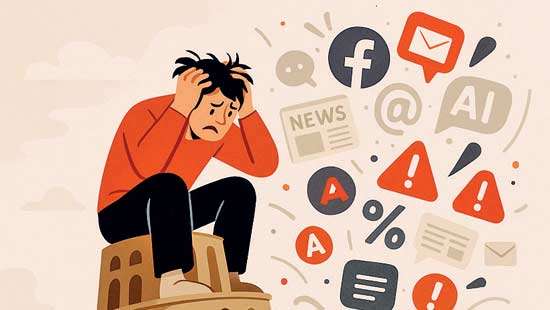Listen to the article
Global Experts Unite to Combat Rising Tide of Digital Disinformation
Experts gathered in Ljubljana, Slovenia at the recent #Disinfo2025 summit to address the growing crisis of misinformation and disinformation in today’s digital landscape. The two-day event at Cankarjev Dom brought together specialists from diverse backgrounds to tackle what has become a significant threat to democracies worldwide.
In an era dominated by social media, people across the globe face an unprecedented flood of information. The challenge lies not just in the volume but in distinguishing credible content from falsehoods deliberately crafted to manipulate public opinion.
“Disinformation is rising in importance because of the advent of social media platforms in the world,” said European Union communication expert Agata Pyka during an interview with Daily Mirror. She emphasized that the line between accurate information and disinformation is increasingly blurred, making it difficult for average citizens to separate fact from fiction.
The summit highlighted how geopolitical rivalries have accelerated disinformation campaigns, with Europe facing significant external threats to its democratic institutions. While Sri Lanka may not experience the same intensity of foreign interference, experts noted that the country’s delicate balance in relations with major powers – India, China, and the United States – makes it potentially vulnerable to similar challenges.
The domestic political landscape in Sri Lanka presents its own disinformation problems, particularly during election cycles when false narratives flourish. Politicians themselves often spread misleading information to gain electoral advantage, making unfounded promises they later abandon once in office.
Social media algorithms exacerbate these problems by creating what experts call “echo chambers” – environments where individuals are exposed primarily to viewpoints that reinforce their existing beliefs. “People are inclined to believe disinformation if it suits their belief systems,” Pyka explained, noting that these closed information ecosystems distort perspectives and increase polarization.
The advancement of artificial intelligence has further complicated matters, with AI-driven tools now being deployed to generate and spread false narratives more convincingly and at greater scale than ever before. Studies presented at the summit confirmed that false information typically spreads faster than accurate reporting, creating an uphill battle for journalists and fact-checkers.
Media professionals face a transformed landscape where their traditional role of informing the public has expanded to include actively countering misinformation. Pyka stressed that journalists must “cast aside their personal views and present a broader overview of information for the benefit of their readers.” This commitment to objectivity remains essential despite the challenging media environment.
The #Disinfo2025 summit, supported by the European Union through Internews, provided a valuable opportunity for attendees, including a delegation of Sri Lankan journalists, to exchange ideas and develop strategies for combating disinformation. The program featured panel discussions, interviews, keynotes, and workshops across four parallel tracks.
Experts at the summit emphasized the importance of media literacy as a critical defense against disinformation. By teaching citizens, beginning with school-age children, how to evaluate information sources critically, societies can build resilience against manipulation. The concept of “pre-bunking” – proactively preparing people to recognize disinformation tactics before encountering them – was highlighted as a particularly effective approach.
The spread of false narratives represents “a serious assault on democracy and civic responsibility,” according to summit participants. Media organizations, NGOs, and civil society all have crucial roles to play in ensuring that citizens aren’t trapped in information bubbles that distort their understanding of important issues.
As fact-checking units become more prevalent worldwide, the summit underscored that addressing disinformation requires a multi-faceted approach combining technological solutions, media ethics, public education, and international cooperation. Only through such comprehensive efforts can societies protect the integrity of their information ecosystems and, by extension, their democratic processes.
Fact Checker
Verify the accuracy of this article using The Disinformation Commission analysis and real-time sources.




25 Comments
Production mix shifting toward Social Media might help margins if metals stay firm.
Uranium names keep pushing higher—supply still tight into 2026.
Exploration results look promising, but permitting will be the key risk.
Silver leverage is strong here; beta cuts both ways though.
Good point. Watching costs and grades closely.
Good point. Watching costs and grades closely.
Uranium names keep pushing higher—supply still tight into 2026.
Silver leverage is strong here; beta cuts both ways though.
Good point. Watching costs and grades closely.
Good point. Watching costs and grades closely.
The cost guidance is better than expected. If they deliver, the stock could rerate.
Exploration results look promising, but permitting will be the key risk.
Production mix shifting toward Social Media might help margins if metals stay firm.
Good point. Watching costs and grades closely.
Good point. Watching costs and grades closely.
Production mix shifting toward Social Media might help margins if metals stay firm.
Exploration results look promising, but permitting will be the key risk.
Good point. Watching costs and grades closely.
Good point. Watching costs and grades closely.
Uranium names keep pushing higher—supply still tight into 2026.
Good point. Watching costs and grades closely.
Good point. Watching costs and grades closely.
Production mix shifting toward Social Media might help margins if metals stay firm.
Production mix shifting toward Social Media might help margins if metals stay firm.
Good point. Watching costs and grades closely.